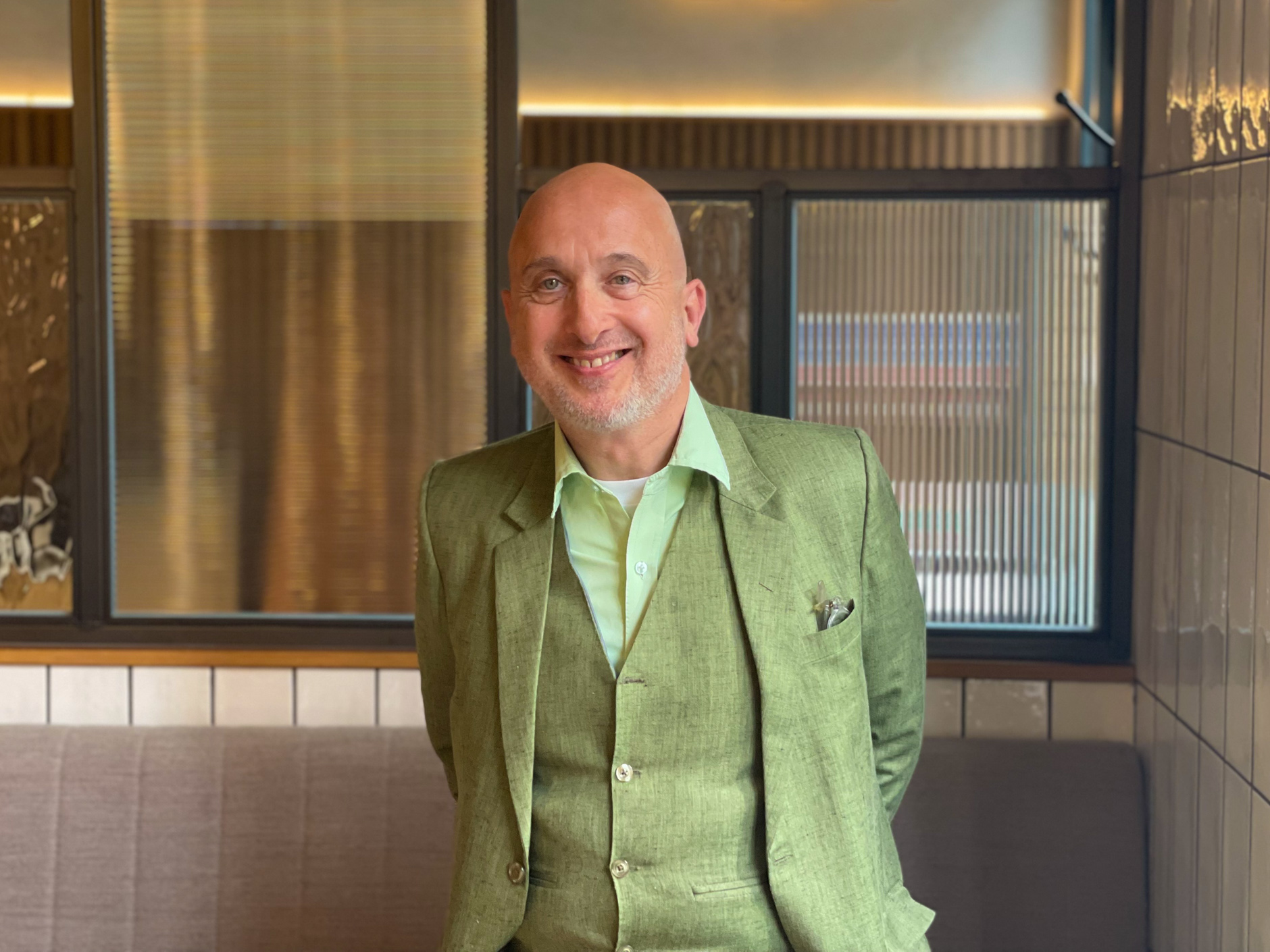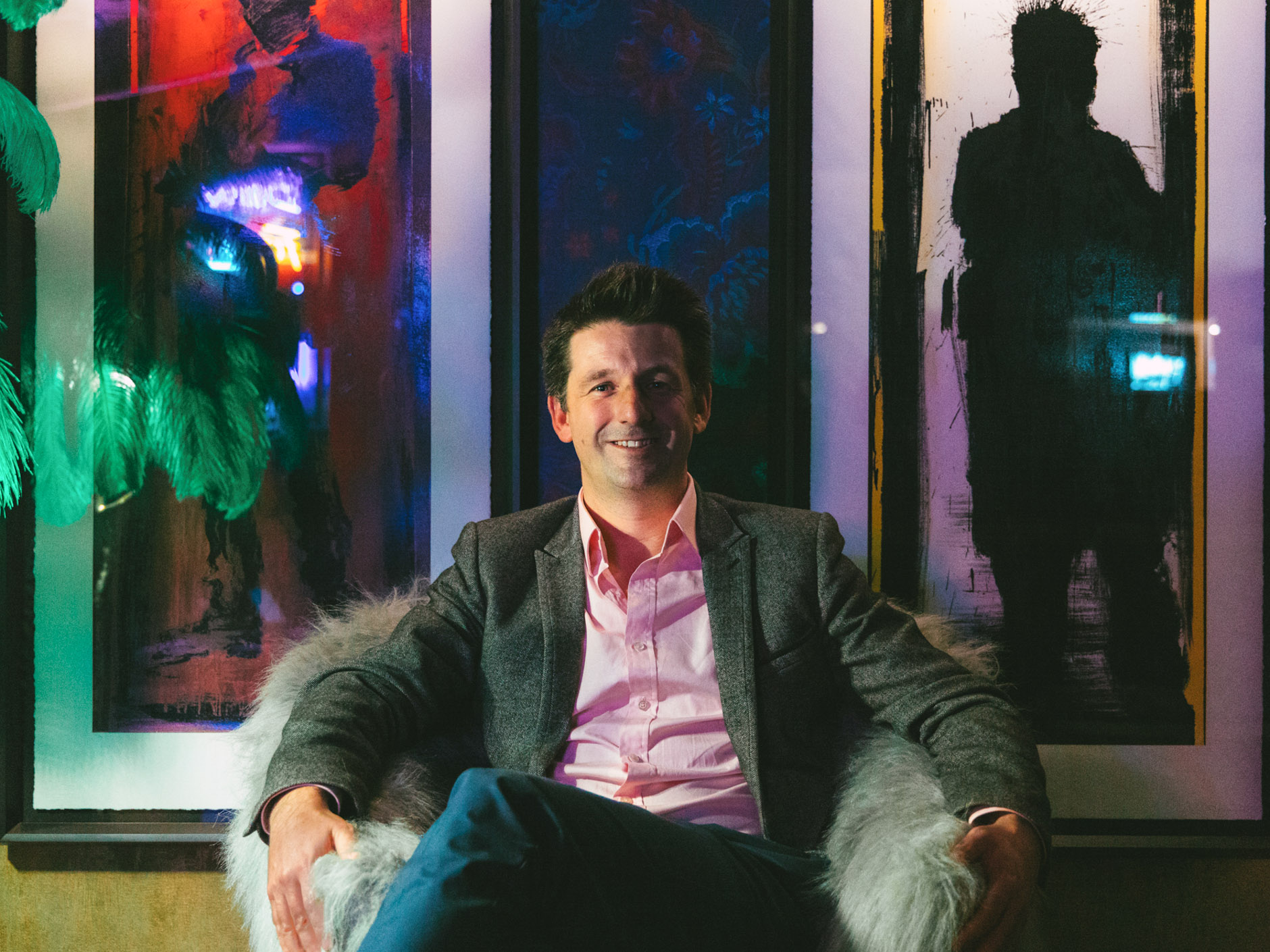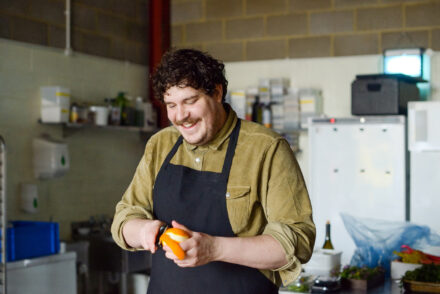Jon Spiteri is one of London’s most charming and recognisable restaurateurs, responsible, at least in part, for some of the city’s most iconic dining rooms.
Palate contributing writer Amanda David (AD) caught up with Jon Spiteri (JS) to discuss opening restaurants, eating lobster soufflé with Fay Maschler and staying sober in the hospitality industry.
AD: Jon, how did you first get started in hospitality?
JS: My mother is Italian and my father was French. They came over in the 1950s from Tunisia to live in Tunbridge Wells, bought an 18-room guesthouse and called it Hotel Tunisia. My family all lived in the hotel with a number of long-term guests who were always around.
When I left school, I didn’t want to work in restaurants. I’d been surrounded by that my whole life. Everything was always about other people, you never felt looked after yourself. We even had our Christmas dinner with the guests. So, I left school and went to work in Moss Bros. After about a month, I realised I couldn’t do it and started as a waiter at Parsons on the Fulham Road.
I went from there to Joe Allen; I worked at Joe Allen for a long time and loved it. After that I went to Peppermint Park, then I worked abroad for a while, in Los Angeles and Australia. Randomly, I was a bartender at some point in the 80s and I won the Western Australian cocktail championship. I invented the Arabesque cocktail – coffee, vodka and Baileys with grated chocolate; my eldest daughter is called Bailey.
Then I came back to England. I was doing some consultancy work for Christina Smith, who sadly died recently. She owned a lot of Covent Garden; I helped set up a restaurant for her there called Smiths and we also set up a little place called Casbah (her name was Christina Anne Smith, hence ‘Cas’). That’s where I met Fergus [Henderson], through his sister Annabel.
Fergus and I talked about opening restaurants but we didn’t have any money. I was a househusband with a young son at the time; Melanie, my wife, was an art restorer working at the Tate. We lived in Soho and I knew Lesley from The French House (she had worked at Peppermint Park years ago); one day we were chatting and she said, ‘look, we’ve got this dining room upstairs, do you want to use that?’ We didn’t have any money; my parents gave us sheets from the hotel to use as tablecloths. In the meantime, Fergus had met Margot and she came in as well; so, we had two chefs and one front of house, which was perfect.
Emily Green wrote our first review and it just went from there. It was an amazing crowd. We had a lot of the YBAs, all the great Soho characters; it was, and still is I think, one of the best dining rooms in London. We did that for a while and then a friend of mine introduced us to Trevor. Trevor had this site in St John Street, a big old smokehouse, and he wanted us to go and work there.
AD: So what happened with The French House Dining Room back then?
JS: Margot stayed on as chef but we needed someone to manage the place, so that’s how Melanie got involved – and actually, they’ve been partners ever since. They stayed there about seven years I think, did some outside catering events and then had the Rochelle Canteen and the ICA.
So Fergus, Trevor and I opened St John. I was there for about three or four years. I was drinking too much at the time and I just got bored with it. I regret leaving actually, but I just thought, I want something else. So I started doing consultancy.
You don’t have to say yes to every invitation. Our whole attitude to drinking in this country is quite strange; it’s not civilised
AD: There’s a lot written about extreme drinking culture in professional kitchens but it’s not just the chefs who are at risk.
JS: It’s hard because in restaurants alcohol is the currency. At the end of shift, everyone says, ‘Let’s have a drink.’ If you do well, you don’t get an extra few quid in your pay, you get a drink; so in the end you’re drinking all the time. Your whole life revolves around people enjoying eating and drinking. It gets out of hand really quickly. You’re working late hours so then the cocaine starts; suddenly you’re doing drugs at work. It’s the whole Anthony Bourdain thing.
I remember at Parsons, even back then in the 70s, I used to take slimming pills, because they were basically speed. Then I started taking actual speed because it was cheaper than the slimming pills. We were up all night. Literally, we would go to bed at seven in the morning, be back into work by four in the afternoon, and do the whole thing again. Over and over again, night after night. At the end of it, I wanted to kill myself. It’s such a dark place, because there is never enough.
When I stopped drinking I was running the Wells Tavern in Hampstead for Beth Coventry, who is Fay Maschler’s sister. I didn’t know what I was going to do. Richard Corrigan said to me, ‘why don’t you come and do a few hours a day at Bentleys?’ So I would do, say, 12pm to 3pm every day, and then go to AA meetings. Richard is a very wonderful and deeply caring man. He can be a brute but I love him.
AD: I have so much respect for the strength it takes to make that decision at all, but particularly in hospitality.
JS: I haven’t drunk for 17 years now. There’s quite a few of us in the industry. Personally, I’m happy talking about drugs and alcohol because I want people to see that you can succeed in the industry without them. I can be in that world now and have no worries about drinking; but when I was younger, I didn’t have an answer. I didn’t know how to stop. You go to every party and you don’t want to leave early because you think people will notice (they never do, by the way). Also, you don’t have to say yes to every invitation. Our whole attitude to drinking in this country is quite strange; it’s not civilised.
AD: So how did you get involved with Sessions Arts Club?
JS: I was introduced to Jonny Gent by restaurateur friends in America I’d known for years. He said he was going to England to open a restaurant and so they hooked us up. Originally, we were going to open Sessions in Battersea; actually it wasn’t even going to be called Sessions, it was going to be called Cabin. That’s always been the idea, to create a place to escape from everything.
Jonny had a friend who was involved in the development at Battersea. We were about to sign the lease when we found out that the tube wasn’t going to be there for another two years. So Jonny, an architect friend of his, Russell, and I all started looking around and we found the Old Sessions House. It was pre-pandemic so it was very busy around Farringdon.
There was a ground floor site which was really lovely but by the time we met the brothers who own the building, Ted and Oliver, the ground floor site had gone. They said, ‘Well we’ve got this dining room upstairs.’ We loved it, but it was a really tricky ask. A restaurant on the fourth floor, via a corridor and a lift; we thought, are we crazy to be doing this? The owners offered to go in with us, so we all became partners and went ahead.
We were literally about to open when the pandemic hit. We had all our staff hired, we’d even invited people to opening parties. Then we had to get rid of everyone, which was terrible. Lots of them had left other jobs; it really was the worst possible thing. And then we were a year and a half without doing anything, with the restaurant on hold.
After that we started again, came to an agreement with Florence and that was it really. I had eaten Florence’s food at Polpetto but I’d never really seen her cook. Some of her dishes now, more and more so, are just unbelievable. She won’t let anything go out of the kitchen unless it’s perfect; every plate has to be pristine and look incredible.
AD: There is a very strong visual element to her work. I recently bought her cookbook; it was written quite a while ago, but even then most of the dishes have just two or three ingredients.
JS: I love that. The French House Dining Room was like that. You don’t need a lot of other stuff, you really don’t. I can’t bear foams and smears; there is something about classic cooking done well. Have you been to Otto’s?
AD: I have; we had a Palate team dinner there recently and Otto invited us back. I loved it. Otto is so charming.
JS: He’s brilliant. Have you had the soufflé with the lobster and the caviar?
AD: Yes, it’s absolute indulgence. I love that it’s named in honour of Fay Maschler.
JS: She’s an amazing woman. I actually went to Otto’s with Fay and the amount of food we ate was phenomenal. It’s a great room as well, a bit mad. Otto is incredible, his history and where he’s worked: New York, Paris. He is an amazing man and there isn’t another restaurant like it in London.
If I go out to a restaurant, it has to be something experiential; it has to be glamorous, something I can’t get elsewhere
AD: What do you think makes a great restaurant?
JS: I think that nowadays with all the delivery options and finish-at-home boxes, what people want is an experience. I can eat really well at home now, so if I go out to a restaurant, it has to be something experiential; it has to be glamorous, something I can’t get elsewhere. I don’t mind what I pay to an extent, but it has to be something different. That’s so important.
AD: That’s interesting. I recently interviewed James Bulmer, the founder of Wonderland, and he said the same. Do you think it’s particularly true since the pandemic?
JS: Yes, 100%. I think the pandemic made everyone think about what they really want in their lives. I don’t like calling it a reset because that sounds too positive but it has made people think. The other thing is, when people go out now they want to feel special, be pampered; it’s easy to do that if you’re good at this stuff.
AD: I know in theory it shouldn’t be complicated but actually very few places get it as right as Sessions.
JS: The staff are amazing. What is lovely about the staff at Sessions was that most of them hadn’t worked front of house before; they were children of friends of ours, a lot of them. So you had a blank slate. They were trained really well and they were looked after; Tamsin, our GM, is really good at looking after the staff. At Sessions we say, bring your worries to work; talk to us. We want you to come and work your shift and be happy. If you’re going through some trauma in your personal life you’re not going to be able to do that, so tell us about it; maybe we can do something to help.
I like personality in front of house staff; I don’t need someone to be any particular type but I like them to be themselves. You have to be able to read the table
AD: What do you look for when you’re hiring front of house staff?
JS: I’d like them to know something about the restaurant. Also they must be willing to learn.
Also I like personality; I don’t need someone to be any particular type but I like them to be themselves. You have to be able to read the table. A good waiter will say, these two people are having a business meeting and they want to be left alone. These two people, they’re on a first date; maybe a few jokes first to break the ice and then leave them alone. These two have been married a long time and they want you to entertain them. Ideally, you also want people who are used to eating in restaurants; I’m not saying I look for that but you need to understand the experience.
AD: I think it’s an underestimated role. Front of house are literally the face of your business.
JS: The majority of our customers never meet me, Jonny or Florence. They are in there being looked after by our team. They represent us.
AD: On my first visit to Sessions I was so struck by how good my waitress, Cassie, was that I tracked her down at the end of the meal and told her.
JS: That’s exactly what I mean; she is lovely and so genuine.
AD: And then on my next visit, Liam was running the dining room. He knew my name, knew I’d been before, which table I’d sat at; I know it’s all on the screen, but he makes it feel very personal. By the way, may I congratulate your sons, Finneas and Lorcan, on their new restaurant, Caravel?
JS: Yes, thank you so much for your lovely review; we were all thrilled! It’s fantastic when someone really gets what you’re trying to do.
AD: I very much enjoyed it. I think there’s an obvious passion there that shines through.
JS: Exactly that! Fin and Lorcan, it’s in their blood. All of us are in hospitality; my daughter Molly too, she works for Koya. What I love about our story is that there was me not wanting to do what my parents did, Melanie with a background in art and now our children, all of us ending up in restaurants! As Marina [O’Loughlin] said too, the boys are cooking what they want to cook, there’s no label. They have crab pasta and they have prawn toast; what’s wrong with that? I love both of those things!
AD: No complaints here. That chilli lemongrass jam with the prawn toast was so good.
JS: You know, I was going to suggest they did something different but when you wrote that in your review I thought, okay I was wrong there! I wanted to talk through the menu with them a lot more. In the end I got in a bit of a huff about it and thought, well, do it your own way then. And they did, and did a really good job. I’m incredibly proud of them. They’re going to open a cocktail bar on one of the other barges soon, and do some collaborations; hopefully Norman’s will do something with them. I love Norman’s. It’s one of my happy places; they’ve got it so right.
I can’t bear foams and smears; there is something about classic cooking done well
AD: Finally, give me three dishes you’ve eaten recently that you would recommend.
JS: First, this dish I had at Mr Ji. It’s a deep-fried brioche with a béchamel sauce, prawn and corn filling, topped with grated Parmesan. It’s just so delicious. When I finished eating it I just thought, I want this again now!
Then there’s the pork and prawn dumplings at Dim Sum & Duck, an incredible dim sum place in King’s Cross. I was there the other night. Alex, the guy who runs it, he’s fantastic. It’s just the best food and so reasonably priced.
For my third dish I thought of Florence’s sirloin in cheese sauce but it can’t be from my restaurant, so I’m going to say the prawn toast from Caravel.
AD: A final bonus dish, as we’ve mentioned them; what’s your go-to order at Norman’s?
JS: That’s hard. The chef, Richie, used to work at Leroy, so actually it’s all wonderful – but they’re very good at fish and chips.






